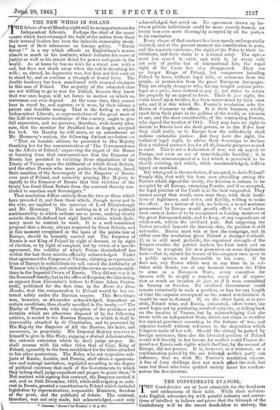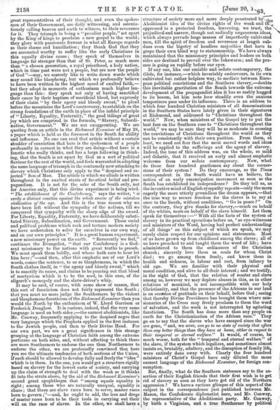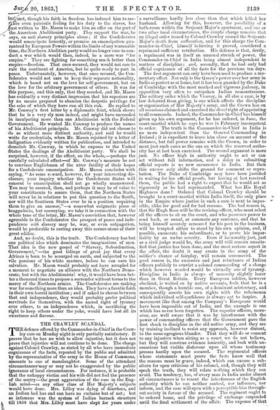THE CONFEDERATE EVANGEE.
THE Confederates are at least admirable for the frankness and enthusiasm of their faith. While their unfortu- nate English advocates try with painful industry and contor- tions of intellect to believe and prove that the triumph of the Confederacy will be the surest death-blow to slavery, the great representatives of their thought, and even the spokes- men of their Government, are daily witnessing, and ostenta- tiously calling heaven and earth to witness, to their reverence for it. They triumph in being a "peculiar people," set apart by the King of kings to proclaim a new gospel to the world; they glory with passionate fervour in what all Europe regards as their shame and humiliation ; they thank God that they are accounted worthy to suffer like the early Christians in this equally divine cause ; they speak of themselves in language far stronger than that of St. Peter, as much more than "a chosen generation, a royal priesthood, a holy nation, which in time past were not a people, but are now the people of God "—nay, we scarcely like to write down words which may sound like blasphemy, but which we profoundly believe to have been written in the highest mood of exalted faith,— but they adopt in moments of enthusiasm much higher lan- guage than this : they speak not only of havinc,p sanctified their cause by their baptism of sacrificial blood, but expressly of their claim "by their agony and bloody sweat," to plead before the mountains the Lord's controversy, to establish on the strong foundations of the earth in place of the infidel principle of "Liberty, Equality, Fraternity," the good tidings of great joy which are comprised in the formula, "Slavery, Subordi- nation, Government." We are not exaggerating. We are quoting from an article in the Richmond Examiner of May 28, a paper which is held as the foremost in the South for ability and influence. No one can read that article without a certain shudder of conviction that here is the spokesman of a people profoundly in earnest in what they are doing—that here is a fanatic who really thinks, and has a large following in think- ing, that the South is set apart by God as a sort of political Saviour for the rest of the world, and feels warranted in adoptinc, the same language of triumph in the contumely now attaching to Slavery which Christiana only apply to the "despised and re- jected" Son of Man. The article to which we allude is written throughout in the exalted strain of fanatical belief and pro- pagandism. It is not for the sake of the South only, not for America only, that this divine experiment is being tried. "The establishment of the Confederacy," says the writer, "is verily a distinct reaction against the whole course of the mistaken civilization of the age. And this is the true reason why we have been left without the sympathy of the nations, till we conquered that sympathy with the sharp edge of the sword. For Liberty, Equality, Fraternity, we have deliberately substi- tuted Slavery, Subordination, and Government. Those social and political problems which rack and torture modern society we have undertaken to solve for ourselves in our own way, and on our own principles." It is a great human experiment, anew missionary power on the earth. "Reverently we feel," continues the Evangelist, "that our Confederacy is a God- sent missionary to the nations with great truths to preach. We must speak them boldly, and whoso hath ears to hear let him hear ;' —and then, after this emphatic use of our Lord's words, comes the sentence, to us so blasphemous, in which the South clothes itself, in "the agony and bloody sweat," which is to sanctify its cause, and claims to be pouring out that blood of martyrdom which is to be the seed, in this case, of the oligarch's monopoly and the slave-driver's whip.
It may be said, of course, with some show of reason, that this sort of fanaticism does not fairly represent the South ; that you must no more judge the Southerners by the violent and blasphemous fanaticism of the Richmond Examiner than you would the North by the enthusiasm of W. Lloyd Garrison or Frederick Douglass. It is curious, indeed, that the very same language is used on both sides ;—the earnest abolitionists, like Mr. Conway, frequently applying to the despised negro that very language which the Prophets applied in the first instance to the Jewish people, and then to their Divine Head. For our own part, we see a great significance in this strange grasping at the language of Christian faith among the extreme partizans on both sides, and, without affecting to think there are more Southerners to endorse the one than Northerners to endorse the other, we are profoundly convinced that here you see the ultimate tendencies of both sections of the Union, if each should be allowed to develop fully and freelythe "idea" which is in them. In the one, you would get a structure rigidly based on slavery for the lowest caste of society, and carrying up the claim of strength to deal with. the weak as it thinks fit into the strata above, by the aid of the Richmond Examiner's second great apophthegm that "among equals equality is right ; among those who are naturally unequal, equality is chaos ; that there are slave races born to serve, master races born to govern ;"—and, he ought to add, the lees and dregs of master races born to be their tools in carrying out their will on the race of slaves. In the other, we shall have a structure of society more and more deeply penetrated by\l-he Abolitionist idea of the divine rights of the weak and th, oppressed to a protected freedom, leavening, we trust, the prejudiced and narrow, though not radically ungenerous ideas, 1 which always pervade large masses of imperfectly cultivated men, till the spirit of freedom and reverence at length sub- dues even the bigotry of headless majorities that have to grope their own blind way to statesmanship. We have always maintained that the missionary principles and leaders on both sides are destined to prevail over the lukewarm; and the pro- cess is going on rapidly before our eyes.
If any one, like our amiable and sedate contemporary, the Globe, for instance,—which invariably endeavours, in its own cultivated but rather helpless way, to mediate between Eturo- pean political convictions and the Southern slavery,—doubts this inevitable gravitation of the South towards the extreme development of the propagandist idea it has so rashly hugged to its bosom, let him note how steadily even the anxious temporizers pass under its influence. There is an address to which four hundred Christian ministers of all denominations in the Southern States have lately given in their signatures at Richmond, and addressed to "Christians throughout the world." Now, when ministers of the Gospel try to put the best face on the Southern case to "Christians throughout the world," we may be sure they will be as moderate in crossing the convictions of Christians throughout the world as they can be consistently with their own position. From them, at least, we need not fear that the most sacred words and ideas will be applied to the sufferings and the agony of slavery. Indeed, the tone of this address was, on the whole, so mild and didactic, that it received an early and almost emphatic welcome from our sedate contemporary. Now, what do these four hundred gentlemen say about the corner- stone of their system ? Do they encourage, as the Times correspondent in the South would have us believe, the notion of an early emancipation movement so soon as the South has established its independence ? Do they tell us, as the inventive mind of English sympathy repeats—only the more eagerly the more utterly groundless the dream appears,—that the true way to secure freedom for the slaves is to say at once to the South, without conditions, " Go in peace ?" On the contrary, they give thanks for slavery,—much on behalf of the whites, more on behalf of the slave himself. Let them speak for themselves :—" With all the facts of the system of slavery in its practical operations before us, as eye-witnesses and ministers of the Word, having had perfect understanding of all things' on this subject of which we speak, we may surely claim respect for our opinions and statements. Most of us have grown up from childhood among the slaves ; all of us have preached to and taught them the word of life; have administered to them the ordinances of the Christian church ; sincerely love them as souls for whom Christ died ; we go among them freely, and know them in health and sickness, in labour and rest, from infancy to old age. We are familiar with their physical and moral condition, and alive to all their interest; and we testify, in the sight of God, that the relation of master and slave among 1.113, however we may deplore abuses in this, as in other relations of mankind, is not incompatible with our holy Christianity, and that the presence of the Africans in our land is an occasion of gratitude on their behalf, before God ; seeing that thereby Divine Providence has brought them where mis- sionaries of the Cross may freely proclaim to them the word of salvation, and the work is not interrupted by agitating fanaticism. The South has done more than any people on earth for the Christianization of the African race." They go on to say that the slaves who have escaped since the war are gone, "and, we aver, can go to no state of society that offers them any better things than they have at home, either in respect to their temporal or eternal welfare." It would, of course, be much worse, both for the "temporal and eternal welfare" of the slave, if the system which legalizes, and sometimes almost insists on, brutality, adultery, and the disruption of family life, were entirely done away with. Clearly the four hundred ministers of Christ's Gospel have only diluted the more earnest language of the Richmond Examiner, for foreign con- sumption.
But, finally, what do the Southern statesmen say to the as- sertion of their English friends that their first wish is to get rid of slavery as soon as they have got rid of the Northern aggression ? We have a curious glimpse of this aspect of the subject in the correspondence just published between Mr. Mason, the Confederate diplomatist here, and Mr. Conway, the representative of the Abolitionist party. Mr. Conway, by birth a Virginian, and a true I3outherner by politica
ins" inct, though his faith in freedom has induced him to sac- ce even patriotic feeling for his duty to the slaves, has ust written to Mr. Mason to make him an offer on the part of the American Abolitionist party. They support the war, he
- says, on anti slavery principles alone ; if the Confederates -would emancipate honestly, or promise an emancipation gua- ranteed by European Powers within the limits of any reasonable time, the Northern Abolition party would no longer care to con- duct a war which would then, indeed, be a mere war "for empire." They are fighting for something much better than empire—freedom. That once secured, they would not care to rule the continent of America, but be quite ready to part in peace. Unfortunately, however, that once secured, the Con- federates would not care to keep their separate nationality, which is based not on the love for self-government, but on -the love for the arbitrary government of others. It was for this purpose, and this only, that they seceded, and Mr. Mason has evidently a very distinct impression that his superiors are by no means prepared to abandon the despotic privilege for the sake of which they have run all this risk. He replied to Mr. Conway's first letter by a diplomatic feint, which shows that he is a very sly man indeed, and might have succeeded in inculpating more than one Abolitionist with the Federal Government. He wanted Mr. Conway to produce the names of his Abolitionist principals. Mr. Conway did not choose to -do so without more distinct authority, and said he would write for credentials, when Mr. Mason rejoined by a letter of indignation evidently written for publication, and intended to demolish Mr. Conway, in which he exposes to the United States the dealings of the Abolitionist party. We shall be surprised, however, if the effect, on the whole,—perhaps the carefully calculated effect—of Mr. Conway's measure be not to convince Englishmen of the utter futility of their hopes for a Confederate emancipation. Mr. Mason concludes with saying, "As some reward, however, for your interesting dis- closure, your inquiry whether the Confederate States will consent to emancipation shall not go wholly unanswered. You may be assured, then, and perhaps it may be of value to your constituents to assure them, that the Northern States will never be in relations to put this question to the South, nor will the Southern States ever be in a position requiring them to give an answer,"—a somewhat enigmatic piece of braggadocio, but conveying, we take it in connection with the whole tone of the letter, Mr. Mason's conviction that, however agreeable to the Confederates the prospect of peace and inde- pendence with slavery may be, war, or even subjugation, would be preferable to casting away this corner-stone of their great edifice.
And, no doubt, this is the truth. The Confederacy has but one political idea which dominates the imaginations of men. That idea is the new gospel of "Slavery, Subordination, -Government,"—the good tidings of great joy that every African is born to be scourged on earth, and subjected to the vile passions of his white masters, before he can earn his salvation. Mr. Mason would probably not have scrupled for a moment to negotiate an alliance with the Northern Demo- crats; but with the Abolitionists! why, it would have been bet- ter a thousand times to propose a surrender without terms to the mercy of the Northern armies. The Confederates are making war for something more than an idea. They have a fanatic faith in their own horrid institution ; and if asked to choose between that and independence, they would probably prefer political -servitude for themselves, with the sacred right of tyranny over others, to an independence which, in sacrificing the right to keep ethers under the yoke, would have lost all its sweetness and flavour.
































 Previous page
Previous page